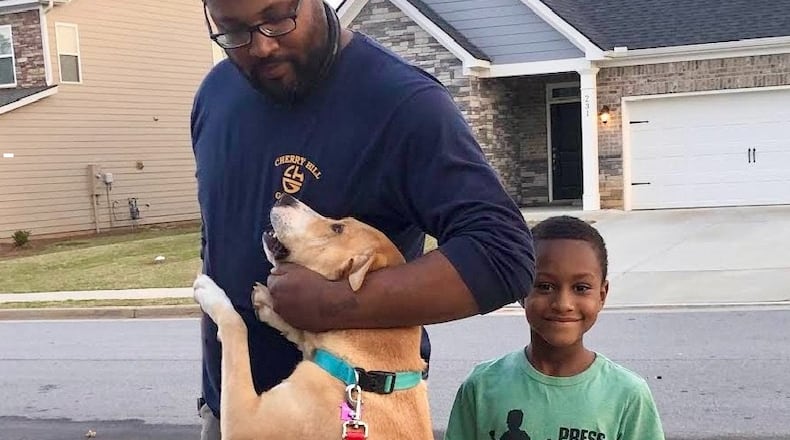Mary Burden has spent the past two weeks calling around to various housing programs.
Her landlord won an eviction judgement and she will soon have to vacate the property in Bankhead where she lives with her two grandchildren, ages 7 and 10.
She doesn’t meet the income qualification for some homes, hotels are booked, and for health reasons, she wants to avoid shelters.
“Everything has happened so fast,” said Burden. “It is so stressful with the kids. I cry and cry and pray and pray.”
In past periods of emotional turmoil, Burden would have had her pets nearby to ease her stress.
“They would always want to be around me,” she said. “They could feel I was stressed out.”
Finding a safe place for her animals is the only thing that has felt under her control during her current housing crisis.
“I was determined to have someplace for them to stay,” Burden said. “I have had them since they were babies.”
On advice from her legal aid attorney, Burden reached out to Paws Between Homes, a local nonprofit founded in 2019 with the goal of preventing permanent separation of pets and their owners during periods of housing instability.
Burden recognizes the irony of knowing that her pets are safe while she and her grandchildren face uncertain circumstances, but she is grateful to be relieved of at least one concern.
Trixie, her Labrador, and Tom, her long-haired white cat, have been staying with a foster family until Burden can find a stable living environment.
Before the pandemic resulted in evictions that contributed to overcrowded animal shelters, Cole Thaler co-founded Paws Between Homes to serve as a refuge for displaced animals in the metro area. Similar organizations have popped up across the country and the city ,including the Safety Net Foster Program launched by Georgia-based LifeLine Animal Project.
Thaler, an attorney who co-directs the Safe and Stable Homes Project at the Atlanta Volunteer Lawyers Foundation, knows how deeply the loss of a pet can compound the trauma a family is experiencing.
“In many cases, it is the children who are most bonded to the animal,” he said. “They may have to change schools, change homes and then lose the family dog. We recognized a need for this type of organization even before COVID,” said Thaler, noting high eviction rates in Fulton County, which have averaged 10,690 per month from January through July, based on data from the Atlanta Regional Commission.
Initially, Paws Between Homes served clients as far as Athens but limited resources forced the organization to confine the service area to inside I-285. The service offers up to 90 days of housing for pets at no cost to the owner.
Each pet is placed with a foster family, and all supplies — bowls, toys, leash, litter box — as well as basic veterinary care from the Atlanta Humane Society — is covered by Paws Between Homes.
The organization has reunited 85 pets with owners since it began operations in 2020, Thaler said. About 25 pets are currently in foster care and 12 more are on a waitlist.
Waitlisted pets remain with their owners until space is available. In emergencies, a partnership with PetSuites in Roswell allows Paws Between Homes to temporarily shelter animals there.
Finding affordable housing in Atlanta is a challenging process and it becomes even more difficult for families who have pets, Thaler said.
Evicted families may have no option but to stay in shelters, in the car, on the street, at hotels or couch surf with friends or relatives.
There is no homeless shelter in Atlanta that allows pets, he said. Most hotels don’t allow pets. And living in a car is difficult to do with a pet.
“The family is forced to surrender the family pet to a local shelter, which is a permanent thing,” Thaler said. “The pet is either adopted out or euthanized.”
About 10% of the time, owners are unable to reclaim their pets. In most cases, Thaler said, the foster family has ended up keeping the animal.
Pets can provide emotional support for families or individuals who are experiencing a crisis, and making sure animals and their owners can be reunited is important work. However, much more important work remains: State and local policymakers must solve metro Atlanta’s affordable housing crisis.
“The thing that has been most painful for me to see,” Thaler said, “has been that sometimes the pets go to stay in foster homes ... while the owner, who is living in poverty, is forced to choose among the very limited affordable housing options in Atlanta.”
Read more on the Real Life blog (www.ajc.com/opinion/real-life-blog/) and find Nedra on Facebook (www.facebook.com/AJCRealLifeColumn) and Twitter (@nrhoneajc) or email her at nedra.rhone@ajc.com.
About the Author
Keep Reading
The Latest
Featured




